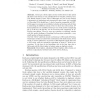Free Online Productivity Tools
i2Speak
i2Symbol
i2OCR
iTex2Img
iWeb2Print
iWeb2Shot
i2Type
iPdf2Split
iPdf2Merge
i2Bopomofo
i2Arabic
i2Style
i2Image
i2PDF
iLatex2Rtf
Sci2ools
138
click to vote
FSE
2008
Springer
2008
Springer
Algebraic and Slide Attacks on KeeLoq
KeeLoq is a block cipher used in wireless devices that unlock the doors and alarms in cars manufactured by Chrysler, Daewoo, Fiat, GM, Honda, Jaguar, Toyota, Volvo, Volkswagen, etc [8, 9, 33, 34]. KeeLoq is inexpensive to implement and economical in gate count, yet according to Microchip [33] it should have "a level of security comparable to DES". In this paper we present several distinct attacks on KeeLoq, each of them is interesting for different reasons. First we show that when about 232 known plaintexts are available, KeeLoq is very weak and for example for 30 % of all keys the full key can be recovered with complexity of 228 KeeLoq encryptions. Then we turn our attention to algebraic attacks with the major challenge of breaking KeeLoq given potentially a very small number of known plaintexts. Our best "direct" algebraic attack can break up to 160 rounds of KeeLoq. Much better results are achieved in combination with slide attacks. Given about 216 known plaintex...
| Added | 26 Oct 2010 |
| Updated | 26 Oct 2010 |
| Type | Conference |
| Year | 2008 |
| Where | FSE |
| Authors | Nicolas Courtois, Gregory V. Bard, David Wagner |
Comments (0)

